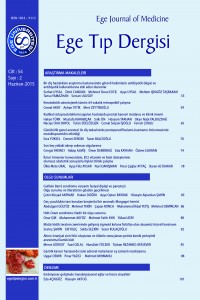Conditions affecting the use of antibiotics and antibiotic knowledge level of dentists working in a dental disease research hospital
Öz
Aim: Antibiotics should be used with caution because of the increase in bacterial resistance, high treatment costs and decrease of the new antibiotic discovery. Rational use of antibiotics is referred as appropriate antibiotic choice, appropriate döşe and duration and the lowest cost. Dentists are frequently confronted with situations like endocarditis prophylaxis, tooth and gum infections, and therefore they often use antibiotics. In this study; the factors affecting rational antibiotic use of dentists working in educational dental hospital were investigated. Materials and Methods: The questionnaire consists of multiple choice questions was performed by answering under surveillance method. Results were analyzed with calculating of frequencies and percentages. Results: Out of 114 dentists included in the study, 73 (64%) were women. In terms of taking anamnesis for appropriate antibiotic prescription, dentists considered himself/herself as very good, good and moderate were 54.1%, 22.3% and 11.5%, respectively. It was found that the dentists working more than fifteen years attended less post-graduation educations and courses about rational antibiotic use, and they often took information about antibiotics from their colleagues. Conclusion: It was observed that scientific resources such as diagnosis and treatment manuals or books, and post-graduation educations in rational antibiotic use are necessary instead of pharmaceutical industry informations.
Anahtar Kelimeler
Bir diş hastalıkları araştırma hastanesinde görevli hekimlerin antibiyotik bilgisi ve antibiyotik kullanımlarına etki eden durumlar
Öz
Amaç: Antibiyotikler, artan bakteriyel direnç, yüksek maliyetler ve yeni antibiyotik keşiflerinin azalması gibi nedenlerden dolayı dikkatli kullanılması gereken ilaçların başında gelmektedir. Akılcı antibiyotik kullanımı (AAK), uygun antibiyotik, uygun süre ve dozda, en düşük maliyet ile bilinir. Diş hekimleri, diş ve dişeti enfeksiyonları, endokardit profilaksisi gibi durumlarla sık karşılaşmakta ve bu nedenle antibiyotikleri sıkça kullanmaktadırlar. Bu çalışmada bir eğitim diş hastanesinde görev yapan hekimlerin AKK'ye etki eden durumlar irdelendi. Gereç ve Yöntem: Çoktan seçmeli sorulardan oluşan anket gözetim altında cevaplama yöntemi ile uygulandı. Sonuçlar sıklık ve yüzdeler hesaplanarak analiz edildi. Bulgular: Çalışmaya dahil olan 114 diş hekiminin 73'ü (%64) kadındı. Reçete yazarken verilecek antibiyotiğe uygun anamnez alma noktasında kendisini “çok iyi”, “iyi” ve “orta” şeklinde tanımlayanların oranı sırasıyla, % 54.1, % 22.3 ve % 11.5 olarak bulundu. Meslekte 15 yılı aşkın süredir çalışan diş hekimleri diğerlerine oranla daha az mezuniyet sonrası eğitim aldıkları, daha az AAK konusunda eğitim aldıkları fark edildi ve 15 yılı aşkın süredir çalışan diş hekimleri, antibiyotik bilgi kaynağı olarak meslektaşlarını daha yüksek oranda kullandıkları görüldü. Sonuç: İlaç sanayinin bilgilendirmeleri yerine; tanı ve tedavi kılavuzları ve kitapları gibi bilimsel kaynaklar ile mezuniyet sonrası AAK eğitimlerine yönelmenin gerektiği görülmüştür.
Anahtar Kelimeler
Ayrıntılar
| Diğer ID | JA46ZC78GY |
|---|---|
| Bölüm | Araştırma Makaleleri |
| Yazarlar | |
| Yayımlanma Tarihi | 1 Haziran 2015 |
| Gönderilme Tarihi | 1 Haziran 2015 |
| Yayımlandığı Sayı | Yıl 2015 Cilt: 54 Sayı: 2 |
Cited By
Tıp Fakültesi Öğrencilerinin Antibiyotik Kullanımının Değerlendirilmesi
Ortadoğu Tıp Dergisi
Osman Kukula
https://doi.org/10.21601/ortadogutipdergisi.482584
Ege Tıp Dergisi, makalelerin Atıf-Gayri Ticari-Aynı Lisansla Paylaş 4.0 Uluslararası (CC BY-NC-SA 4.0) lisansına uygun bir şekilde paylaşılmasına izin verir.

